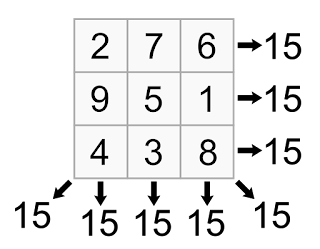Magic Grammar Square
Recently I learned about the concept of the "Magic Square."
Here's one:
What's magic about it is that if you sum the numbers in any direction, you get 15.
I was thinking about how one might make a Magic Grammar Square, in which no matter which directly you read it, you get a grammatical English sentence.
This is one I came up with:
If you read it in the direction of the arrows, you get a grammatical sentence, though some of them are a little unusual.
"Deer chase now."
If the deer weren't chasing, you might say this to indicate that now, the deer are chasing.
"May arrived fast."
Suggests that spring came up sooner than you expected.
"Sometimes back completely."
Suppose you're talking about backing a project or startup, and talking about whether or not you should ever back one completely.
"Deer may, sometimes."
Other times they may not.
"Chase arrived back."
Chase is your friend, he arrived and he was coming back when he did.
"Now fast completely."
You're giving someone instructions on a cleanse.
"Deer arrived completely."
To emphasize that they might not have completely arrived, but indeed they did.
This would be even better if all of these sentences made some sense backward, but making this was hard enough as it was. In particular, the trick is that the top left square should be a noun (preferably one that sounds the same as singular or plural).
The cells with "chase" and "may" should be words that can be both nouns and verbs.
The cells with "sometimes" and "now" need to be both nouns and adverbs.
The middle cell need only be a verb. Past tense makes the conjugation check out.
The cells with "fast" and "back" need to be both verbs and adverbs.
The bottom right cell ("completely") need only be an adverb.
Making it was kind of fun. Give it a try.
Here's one:
What's magic about it is that if you sum the numbers in any direction, you get 15.
I was thinking about how one might make a Magic Grammar Square, in which no matter which directly you read it, you get a grammatical English sentence.
This is one I came up with:
If you read it in the direction of the arrows, you get a grammatical sentence, though some of them are a little unusual.
"Deer chase now."
If the deer weren't chasing, you might say this to indicate that now, the deer are chasing.
"May arrived fast."
Suggests that spring came up sooner than you expected.
"Sometimes back completely."
Suppose you're talking about backing a project or startup, and talking about whether or not you should ever back one completely.
"Deer may, sometimes."
Other times they may not.
"Chase arrived back."
Chase is your friend, he arrived and he was coming back when he did.
"Now fast completely."
You're giving someone instructions on a cleanse.
"Deer arrived completely."
To emphasize that they might not have completely arrived, but indeed they did.
This would be even better if all of these sentences made some sense backward, but making this was hard enough as it was. In particular, the trick is that the top left square should be a noun (preferably one that sounds the same as singular or plural).
The cells with "chase" and "may" should be words that can be both nouns and verbs.
The cells with "sometimes" and "now" need to be both nouns and adverbs.
The middle cell need only be a verb. Past tense makes the conjugation check out.
The cells with "fast" and "back" need to be both verbs and adverbs.
The bottom right cell ("completely") need only be an adverb.
Making it was kind of fun. Give it a try.



Comments